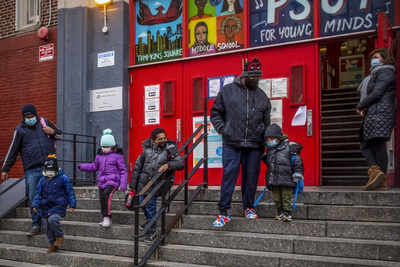Latest Education news – Board Exam Results, Admit Cards, Exam Paper Analysis and Question Papers | Times of India
In a striking act of resistance, New York state officials have refused to yield to the Trump administration’s latest attempt to dismantle diversity, equity, and inclusion (DEI) initiatives in public education. The state’s Department of Education, in a sharply worded letter, made clear that it would not adhere to federal demands to end DEI practices as a condition for continued funding.
Daniel Morton-Bentley, counsel and deputy commissioner of the New York State Education Department, directly challenged the federal directive, stating that the department “does not believe the federal agency has authority to make such demands.” His April 4 letter to the U.S. Department of Education sets the stage for a significant legal and political clash over the role of DEI in schools and the boundaries of federal oversight.
Rejecting the narrative of censorship
Morton-Bentley’s letter did not mince words. “We understand that the current administration seeks to censor anything it deems ‘diversity, equity & inclusion,’” he wrote. “But there are no federal or State laws prohibiting the principles of DEI.”
His message pushes back against what many see as a politically driven campaign to erase DEI frameworks from American education. While the Trump administration claims DEI efforts discriminate by favoring certain groups over others, New York officials maintain that these initiatives are essential to fulfilling the promises of equality and opportunity in public schooling.
Legal standing questioned
New York’s refusal rests heavily on its assertion that the U.S. Department of Education is overstepping its legal authority. The letter emphasizes that the state has already affirmed compliance with Title VI of the Civil Rights Act of 1964—most recently in January—and that the federal government’s new demands are “based on a faulty legal interpretation.”
Furthermore, Morton-Bentley underscored that no formal administrative process has been undertaken that would legally justify the withdrawal of funds. Without such a process, he argued, the federal threats amount to political coercion rather than lawful oversight.
The federal demand: DEI or dollars
The controversy began with an unprecedented directive issued by the Trump administration last Thursday. The order gave K-12 schools nationwide just ten days to certify that they are not engaging in DEI practices considered discriminatory under federal civil rights laws. Compliance was tied explicitly to the continuation of federal education funding, including Title I aid—which supports schools in low-income communities and distributes billions annually.
Craig Trainor, the acting assistant secretary for civil rights, defended the demand as a matter of legal compliance. “Federal financial assistance is a privilege, not a right,” he said, as reported by the Associated Press. But critics have argued that conditioning funds on political interpretations of civil rights undermines the very foundation of public education.
A sudden shift in doctrine
The New York Education Department also drew attention to the ideological whiplash at play. Morton-Bentley referenced 2020 remarks by then-Secretary of Education Betsy DeVos, who described diversity and inclusion as “cornerstones of high organizational performance.” The current stance, he noted, represents an “abrupt shift” with no justification for the reversal.
The administration’s pivot, critics say, reflects a broader political agenda rather than any substantive change in legal or educational understanding.
A broader pattern of federal leverage
This isn’t the first instance of New York clashing with the Trump administration over federal funding. The state recently refused to comply with a demand to shut down a congestion pricing plan intended to fund mass transit in Manhattan. That resistance now appears to be part of a broader strategy to reject federal overreach.
Education, in particular, is emerging as a battlefield. While Trump has promised to return control of schools to state and local governments, critics say his administration’s DEI ultimatum is doing precisely the opposite—centralising authority in Washington and threatening to financially punish states that dissent.
The stakes ahead
As the 10-day deadline for certification looms, New York’s firm stance places it on a collision course with the federal government. Should Washington move to withhold funds, it could trigger legal challenges with nationwide consequences, especially for underserved communities that rely on Title I assistance.
New York’s refusal may encourage other states to challenge the administration’s mandates. The coming weeks could determine not only the future of DEI in public schools but also the broader relationship between states and the federal government in shaping educational values.
For now, New York has drawn a line: DEI is not a deviation from civil rights law—it is, the state argues, a fulfillment of it.
#schools #draw #line #DEI #federal #pressure #Times #India
